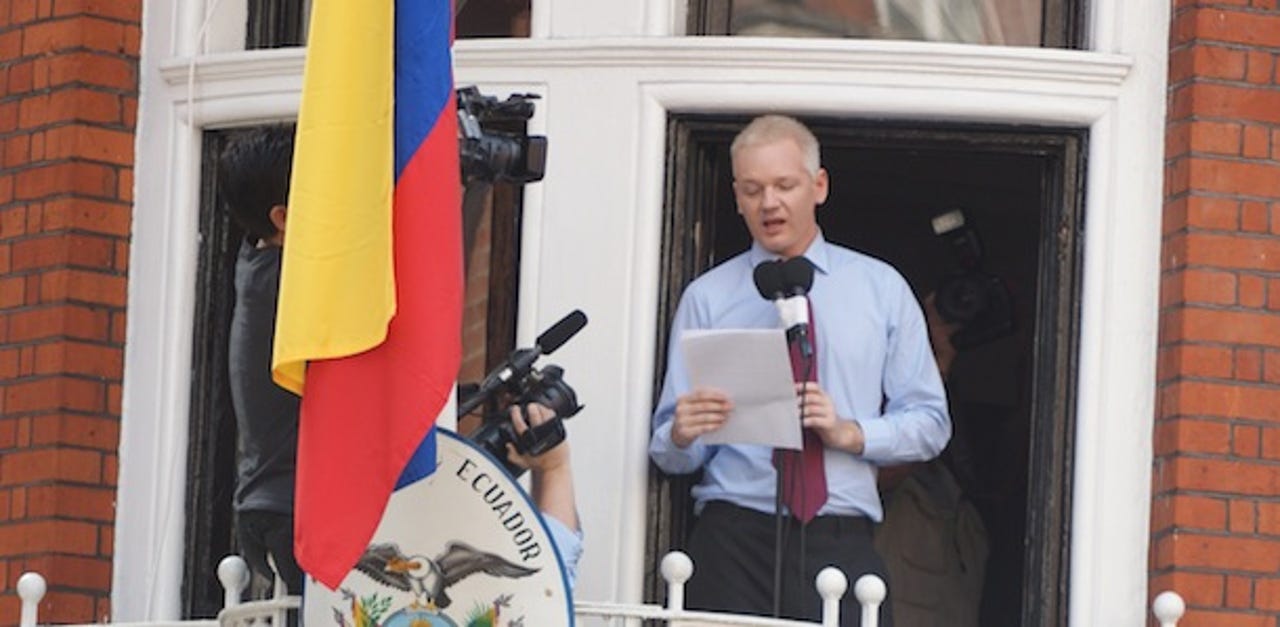Assange: U.S. 'witch hunt' against Wikileaks must end


LONDON -- Wikileaks founder Julian Assange addressed his supporters and the media at the Ecuadorian embassy in London, exactly two months after first entering the embassy and days after receiving asylum from Quito.
Assange said the U.S.-led "witch hunt" against Wikileaks must stop, and the U.S. government must not "persecute its staff and its supporters."

Assange's short statement described Ecuador's move to grant him asylum as "courageous," and outlined a number of points he wished to see in the future.
But one of the stipulations of his asylum would be that he is not allowed to give political statements or face his status rescinded -- a balance he was surely careful to manage.
He said the U.S. must "dissolve its FBI investigation," and pledge not to pursue journalists against "shining the light on the secret crimes of the powerful."
"There is unity in the oppression; there must be absolute unity and determination in the response," he added.
He also thanked the people of the U.S., the U.K., Sweden, and Australia for their support, "even when their governments have not."
"And to those wider heads in government, who are still fighting for justice. Your day will come."
Two months on
Today's press conference marks two months since the Wikileaks founder entered the Ecuadorian embassy in London on June 19, breaking U.K. bail conditions ahead of his planned extradition to Sweden to face questioning over alleged sexual crimes.
Around 100 U.K. police officers remain stationed outside the embassy, surrounding the building should the Wikileaks founder attempt an escape.
Fewer protesters turned up than expected, in the region of around 150--200 protesters, many native Ecuadorians. Many donned the Anonymous masks associated with the whistleblowing and anonymity movement.
Last week, Ecuador granted the Australian national asylum citing reasons that the Swedish or U.K. government could not guarantee he would not be transferred to a third-country, such as the United States, where he may face the death penalty under the Espionage Act.
Assange spoke today from within the walls of the embassy close to the ground floor balcony -- around six feet from the ground -- as to remain on Ecuadorian soil.
Ecuador to the 'World Court'?
Ecuadorian officials said they may appeal to the International Court of Justice, the so-called 'World Court,' to prevent Assange from being arrested by U.K. authorities if he steps out of the embassy where he remains.
The "threat" by the U.K. government to revoke the diplomatic status of the embassy and storm the building resulted in an emergency meeting of American states to discuss Britain's escalation in rhetoric.
The move to suggest the building could have its embassy status revoked by U.K. authorities -- in which it says it has the right to do -- puts the very nature of embassies abroad in jeopardy.
The U.K.'s Diplomatic and Consular Premises Act 1987 would allow the U.K. government to revoke the diplomatic immunity of an embassy in the country, but Ecuador claimed this would be a breach of the Vienna Convention that first set out the rules and rights of embassies in host nations.
William Hague said on Thursday: "There is no threat here to storm an embassy. We are talking about an Act of Parliament in this country which stresses that it must be used in full conformity with international law."
The leaks must flow
Documents and leaked information continues to flow out of Wikileaks, two years since more than 250,000 U.S. diplomatic cables were released by the whistleblowing organization.
Wikileaks' latest release, The Global Intelligence Files, saw 5 million emails by private intelligence firm Stratfor leaked onto the Web. Anonymous was thought to have been behind the attack in which the emails were stolen, and were handed to Wikileaks for publication.
The latest controversy stirred as TrapWire, a 'global' private surveillance service, was discovered in the latest cache of emails. Links were found between the TrapWire company and Anonymizer, a service used for anonymous Web browsing by activists and at-risk populations.
It follows similar releases, such as the "Spy Files" and the "Syria Files" in recent months.
In the last few weeks, denial-of-service attacks against various websites -- including Russia Today, and Wikileaks itself -- resulted in targeted sites crumbling under the sheer weight of the attacks.